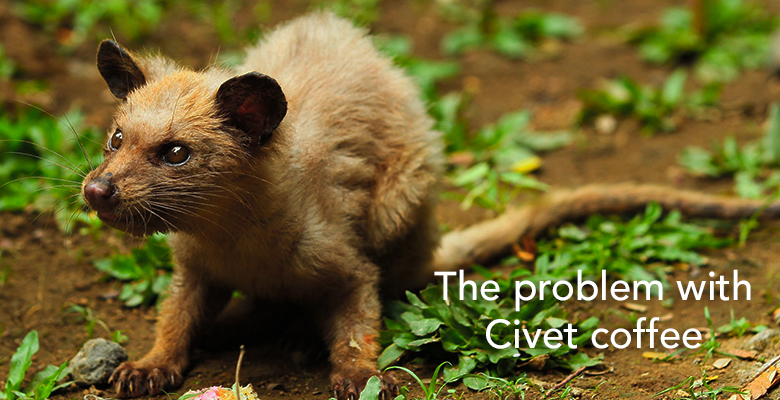The problem with Civet coffee

Civet coffee — or Kopi Luwak — is a luxury brew, at almost $100 (or £77) per cup. Less acidic and nuttier in taste than many other speciality brews due to the partially digested coffee beans excreted by the Asiam palm civet.
The problem is that the for the most part, the welfare of the beautiful civet is declining as a result of unethical practices by some Asian coffee growers.
Historically, kopi luwak was made using palm civet droppings harvested in the wild.
The cat-like animal eats coffee cherries that are partially digested, with only the flesh of the cherries being fully processed. This leaves the rest to pass through the animal with stomach enzymes slightly digesting the coffee beans adding to the aroma and flavour.
Half a kilogram of the beans can cost up to $600 with some coffee shops around the globe requesting $100 per cup for a taste of this extremely exclusive brew.
Of course this high price has now seen many coffee growers in the Asian region capturing wild civets, keeping them in cramped cages on their plantations.
A wild civet will only snack on coffee beans as part of their balanced regular day-to-day diet. But those in captivity are fed large amounts of unripe coffee cherries.
Normally a nocturnal animal, the health and well-being of the small cat creature deteriorates when caged in bright and small spaces. Many fight amongst themselves, chew on their own legs and tend to get sick and die quickly.
Luckily many brands are becoming aware of the harm that these horrendous and abhorrent farming practices are having on the welfare of the species, with Harrods, and Selfridges removing the coffee from their shelves.
But unfortunately for the most part civet-coffee is unregulated, the origin of the beans is hard to determine; and it’s even more difficult to decipher if the beans are ‘cruely-free’.
We suggest just avoiding buying or importing the coffee unless you are absolutely certain that the beans have been harvested safely from wild civets.
Creating demand is just a catalyst for increasing this kind of production practice, and we cannot condone the actions of a few selfish growers.
No coffee is worth the price of animal cruelty.
